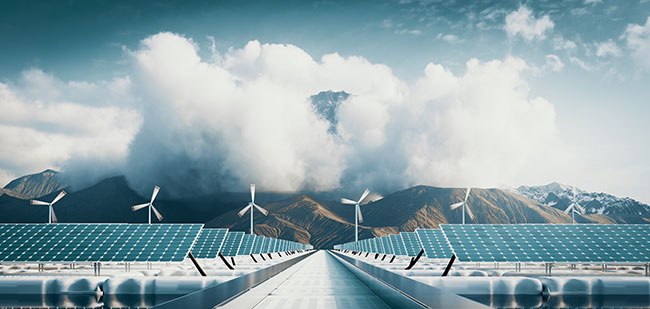
Features
In-Depth
Sustainability
Power Struggle: How can RAS be truly sustainable?
August 22, 2022 By Maddi Badiola, PhD, PM
 The RAS industry has in its hands the opportunity to make a change in how it consumes energy. Photo: Getty images/ Petmal
The RAS industry has in its hands the opportunity to make a change in how it consumes energy. Photo: Getty images/ Petmal The United States’ CO2 emissions alone are projected to reach 4,807 million metric tons by 2050, a number high enough to get anyone worried, not only individuals, but major industry players.
However, let’s be realistic. Making our lifestyles more sustainable implies efforts and advanced economical investments to later obtain benefits. It is like installing solar panels in our houses. The initial investment is high but in the mid to long term, economic and environmental benefits compensate it. Thus, why is sustainable technology good for each business and thereafter, better for the industry. Because it makes a difference with others, because it keeps business competitive while helping the environment, remaining compliant with standards, and reducing risk.
When using renewable and biodegradable materials, we are indirectly protecting the ecosystem (and our business) from the negative effects of climate change. Nowadays, many businesses make use of sustainability to improve production and innovation, making it desirable for investors.
So, is Recirculating Aquaculture System (RAS) a truly sustainable technology? Funny that currently I am asking myself such a question. Since I began my aquaculture career around 13 years ago, this technological system has been described as the most sustainable, green food production system. RAS require less water, has higher yield per square foot, limited water discharges (with even better water quality than the incoming water), and it is usually located near the consumers and thus, able to decrease the transportation impacts.
These are some of the reasons and claims that the industry is making, but are we truly seeing this in the industry’s execution?
That RAS reduces negative environmental impacts in comparison with other technologies is well-known and has been proven. Waste generated by cow or pig production, for example, cannot compare with on-land fish production. There is also the difference in feed requirements. Fish feed conversion ratios can be exceptional in comparison to other protein feed conversion ratios.
What about replacement of non-renewable resources and energy usage? Is this technology substituting resources and efficiently using them? I am afraid that the answer is no.
The importance of energy sources is a topic of conversation that will continue over the next decades. We are beginning to realize the value of utilizing technologies to promote sustainable energy development, as opposed to obtaining energy from sources that do not naturally regenerate.
The global crisis that we all are suffering is mainly due to power. Which one? The one coming from ambition, money, having more than your opponent, creating the ones with less your slaves, you being the one controlling the situation, the planet. And ironically, this is played with just one card, the other power, the one we need to run our houses, our cars, our businesses. Saying this, could we say that the planet is run (from all perspectives) by energy? Could we change the world by changing our energy? In this case, the answer is yes.
The RAS industry has the potential to be the Tesla or the Ferrari or the Audi of the food production, but we still need to learn how to drive it. We have in our hands the opportunity to make a change. With a relatively new industry (in comparison with others), the horizon is bright and promising. From a young woman’s industry-passionate eyes, I see it as feasible. Do you?
Spend less and gain more, stay competitive in the market, make profit while helping the planet. Energy is neither generated nor destroyed, it is transformed. As we are modifying our way of living, let’s make a change in such transformation. And do not forget, farmed is the way, RAS the technology.
Maddi Badiola, PhD, PM, is a RAS engineer and co-founder of HTH Full Spectrum (fullspectrumaquaculture.com; HTHaqua.com) in Basque Country, Spain. Her expertise include energy conservation, lifecycle assessments and RAS global sustainability assessments. Email her at mbadiolamillate@gmail.com.
Print this page